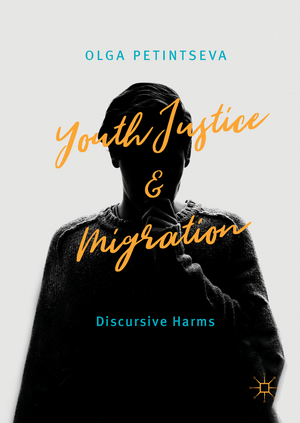Youth Justice and Migration: Discursive Harms
Autor Olga Petintsevaen Limba Engleză Hardback – 29 aug 2018
| Toate formatele și edițiile | Preț | Express |
|---|---|---|
| Paperback (1) | 385.25 lei 6-8 săpt. | |
| Springer International Publishing – 22 dec 2018 | 385.25 lei 6-8 săpt. | |
| Hardback (1) | 502.22 lei 6-8 săpt. | |
| Springer International Publishing – 29 aug 2018 | 502.22 lei 6-8 săpt. |
Preț: 502.22 lei
Preț vechi: 590.84 lei
-15% Nou
Puncte Express: 753
Preț estimativ în valută:
96.10€ • 100.33$ • 79.53£
96.10€ • 100.33$ • 79.53£
Carte tipărită la comandă
Livrare economică 05-19 aprilie
Preluare comenzi: 021 569.72.76
Specificații
ISBN-13: 9783319942070
ISBN-10: 3319942077
Pagini: 166
Ilustrații: XIX, 269 p.
Dimensiuni: 148 x 210 mm
Greutate: 0.5 kg
Ediția:1st ed. 2018
Editura: Springer International Publishing
Colecția Palgrave Macmillan
Locul publicării:Cham, Switzerland
ISBN-10: 3319942077
Pagini: 166
Ilustrații: XIX, 269 p.
Dimensiuni: 148 x 210 mm
Greutate: 0.5 kg
Ediția:1st ed. 2018
Editura: Springer International Publishing
Colecția Palgrave Macmillan
Locul publicării:Cham, Switzerland
Cuprins
Foreword.- Prologue.- Introduction.- Chapter 1. Working premises and methods: Discriminatory practices of youth justice as epistemology.- Chapter 2. War torn children and criminal vagabonds.- Chapter 3. Age, agency, responsibility.- Chapter 4. Living up to ‘good family’ ideals.- Chapter 5. The significance of school-based reports.- Chapter 6. Discursive harms.- Chapter 7. Practicing youth protection.- Conclusions.
Notă biografică
Olga Petintseva is a post-doctoral researcher at Ghent University, Belgium. Her research interests are located at the intersection of critical criminology, migration studies and linguistics. She is particularly interested in how migration impacts or becomes centred out in ‘domestic’ institutions, which are not structurally accustomed to mobility and diversity (e.g. criminal justice).
Textul de pe ultima copertă
This book examines the implications of the professional and judicial discourses on migrant youth in the Belgian youth justice system. Drawing on a detailed study of 55 court case files and in-depth interviews with over forty youth justice professionals, the book explores the problematisations of migrant Roma and Caucasian young people in the youth justice system to argue that they result in ‘discursive harms’. It discusses the assumptions and the effects of explanations of deviant behaviour, ambiguities in representations of young people’s agency and responsibility, differing assumptions about the moral potential of Roma and Caucasian families, and the reframing of assessments in school-based reports as signals of delinquency. The book reflects on how to address the ‘discursive harms’ identified and calls for a review of protection practices and ideals from a fundamental rights perspective. This book contributes to a topic that will have increasing significance for youth justice practice in Belgium as well as the rest of Europe.
Caracteristici
Examines the intersections of youth justice and migration Draws on rich empirical data from a study in Belgium Calls for a review of protection practices Discusses the concepts of discriminatory ethnicisation, culturalisation and migrationisation
